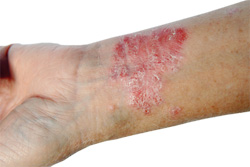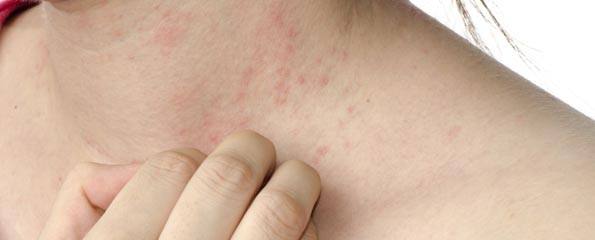Psoriasis: How Alison manages her flaking scalp
Psoriasis is a skin disease that can manifest itself as red, scaly patches which can become itchy. White or silvery scales can also form over these patches, which is quite characteristic of psoriasis.
People suffering from psoriasis do so in varying degrees of severity but nearly all cases are quite manageable.
We spoke to Alison about her first-hand experience with a mild case of psoriasis that shows up mainly on her scalp and find out how she manages to keep it under control.
You can’t choose your genes
Alison was in her mid-twenties when she noticed some flaking on her scalp.
“Both my dad and my sister have had the same problem so I knew straight away what it was and I didn’t really worry about it too much at first,” she said.
There was a fair chance that Alison’s assumption was correct as 30% of people with psoriasis have an immediate family member who is also affected. So Alison can thank her dad for this wonderful genetic gift!
Alison went on to describe what it is like for her living with psoriasis on a day-to-day basis.
“It’s not painful but it is annoying,” she said.
“It’s like having really bad dandruff; my scalp gets really itchy and it flakes away which can make a mess of your clothes and the couch.
“It’s definitely something that is more frustrating than painful.”
It’s a marathon not a sprint
 Alison is fairly lucky in that she only suffers psoriasis on her scalp. For some people the red flaky plaques can appear over their entire body, the elbows in particular are a common area for psoriasis to occur.
Alison is fairly lucky in that she only suffers psoriasis on her scalp. For some people the red flaky plaques can appear over their entire body, the elbows in particular are a common area for psoriasis to occur.
Psoriasis of the scalp usually occurs within the hairline but can involve the whole scalp. It features the same red scaly plaques as psoriasis on other areas of the skin but, contrary to what some sufferers fear, is not associated with hair loss.
But while Alison may only have the skin complaint on her scalp she does suffer from another symptom of psoriasis.
“I get pain in my right hip which I have had for about 5 years,” she said.
“It comes and goes so I was never that worried about it, but I did eventually get it checked out and the doctors thought it was an enthesopathy, which is related to psoriatic arthritis.”
Because psoriasis is caused by an overactive immune system the body can develop other inflammatory symptoms such as the arthritis that Alison experiences.
Psoriatic arthritis only affects between 5–8% of people with psoriasis so Alison is definitely in the minority with this one.
Despite the flaking scalp and hip pain Alison says that her psoriasis doesn’t interfere too much with her everyday life.
“I guess it’s not too bad for me as I only get it on my scalp and when it’s well controlled it doesn’t really bother me at all,” she said.
“The psoriatic arthritis has never stopped me from being active, I’ve always been pretty sporty and have run marathons but I guess I may still run into problems when I’m older.”
Alison’s active lifestyle is likely to be one of the reasons that her psoriasis is relatively mild.
Things like excessive alcohol and tobacco use can exacerbate the condition while maintaining skin hydration and keeping stress levels low will help to keep the psoriasis under control.
A crash course in psoriasis management
Alison says it can be expensive trying all the different treatments that are available in a quest to find the one that works for you.
“I was probably a bad patient because I would try something a couple of times and if I couldn’t see any improvement I would stop using it and move onto something else,” she said.
“I would have tried at least ten different types of shampoos, plus creams and some home remedies.
“Someone once told me to put Vaseline in my hair then wrap it in gladwrap before going to bed, I tried it but it didn’t work either.”
Alison had passed Psoriasis Management 101. Her symptoms were mild so she tried topical over-the-counter remedies but when these weren’t helping she made the right choice to see a professional.
“I was so frustrated nothing was working that I decided to book an appointment with a dermatologist,” she said.
A dermatologist or general practitioner will assess the type and severity of your psoriasis and prescribe appropriate treatment.
Your doctor may decide to give you a prescription for a cream or lotion (often containing a corticosteroid), refer you to be treated with phototherapy or prescribe one of the newer systemic (absorbed in one part of the body but affects another) biological therapies.
It is important to remember that psoriasis is not curable but if you follow your doctor’s advice you should be able to control the symptoms.
Pregnancy bumps out the psoriasis
 By the time Alison had seen the dermatologist and received a prescription from them to treat her psoriasis she fell pregnant and wasn’t able to use the treatment.
By the time Alison had seen the dermatologist and received a prescription from them to treat her psoriasis she fell pregnant and wasn’t able to use the treatment.
“Because I fell pregnant and couldn’t use the medication, I’m not sure how it would have worked but I can tell you that switching to an ‘organic’ style shampoo made a huge difference,” Alison said.
“Switching to a shampoo that was free from preservatives and harsh chemicals and completely free from sodium laureth sulphate, which is known to be a trigger for psoriasis, has been the thing that worked best for me.”
Aside from her new shampoo Alison does have a novel way of controlling her psoriasis that isn’t going to be practical for everyone, especially our male readers!
“I have been pregnant twice now and it seems to go away completely during that time,” she said.
“The pain in my hip also went away while I was pregnant because my muscles and tendons in that area were more relaxed.
“After my first pregnancy the psoriasis never came back as bad as it was before I was pregnant.”
But since Alison’s situation may not be the same as yours, perhaps it’s best to think of the possible lessening of psoriasis symptoms as bonus of becoming pregnant, not a reason to start trying!
A little bit of advice…
Alison was lucky that her psoriasis was even less severe once her children were born but we still wanted to know if there were any triggers that she was aware of that caused the psoriasis to flare up.
“There has never really been anything that I can pin down as a reason for it to flare up,” she said.
“A lot of people say that stress can play a big part in setting it off but I wouldn’t describe myself as someone who suffers with stress.
“During the winter months if a don’t dry my hair really well and my scalp is a bit damp it can aggravate the psoriasis but apart from that I can’t really attribute it to anything in particular.
“The only time that it has gone away completely was when I was pregnant.”
Alison said the best advice she can give to people that might be dealing with psoriasis is to seek professional treatment early.
“If you don’t have any luck with your GP then ask for a referral to a dermatologist who obviously deals with skin complaints on a day to day basis,” she said.
“Don’t be impatient with the treatments like I was. Try to see out each treatment regime before deciding yourself that it isn’t working.”
Taking on board this great advice from Alison will ensure you give yourself the best chance of managing your psoriasis effectively, especially if getting pregnant isn’t for you!
 | For more information about the types of psoriasis, how they can be treated, great videos and more, see Psoriasis. |
Have a health experience you want to share? Contact us
Dates
Tags
Created by:

 Login
Login














